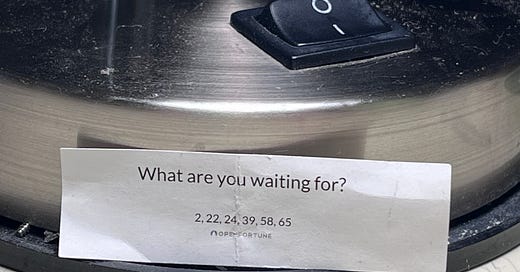A slip of paper, rescued from a fortune cookie, sits propped up against the base of my dusty desk lamp. “What are you waiting for?” it asks me, daily.
Sometimes, the question prods me to meet a deadline or stop putting off a difficult conversation. But mostly, it reminds me that today is the day to take the next step. Today is the day to write that proposal, send that query, follow up with that client, to market my writing. Today is the day to write this newsletter, even if it goes out a few hours late.
How about you? What are you waiting for? Maybe today is the day to respond to that call, that itch in your soul. To just begin writing a very, very rough draft. To write a thousand words, and then another thousand tomorrow. To outline your book. To sign up for a writing workshop or a mentoring program or a writers’ conference. To just sit down and start writing, for God’s sake. And your own sake.
I talk to writers who often say they feel called to write, and yes, that is a thing. Who is doing the calling? I guess that depends on your faith or worldview. Maybe God, maybe your deepest self, maybe the universe.
Frederick Buechner wrote, “The place God calls you to is the place where your deep gladness and the world’s deep hunger meet.”
The reason writers get stuck or don’t respond to that call is they either focus entirely too much on their own gladness, or not enough. You’d maybe expect it to mostly be the latter: writers let shame and fear block the voice of gladness. But often, writers forget that their book is not just about them (and their gladness or desire or whatever)—it’s for a reader. Both extremes—focus on our own gladness, or fear of it—keep us from hearing the call. Wrapped in self-absorption on one hand, or self-loathing on the other, we miss entirely the point: the world’s deep hunger.
If you feel called to write, it is because you have something to say, and someone who needs to hear it. Someone who has a deep hunger to learn or connect or understand. Your words will feed that hunger, if you write them.
If you feel called, compelled to write, Buechner’s observation leads us to two questions: what would your deep gladness have you write, and whose deep hunger will it appease?
In other words, what will you write, and who is it for? Writers sometimes skim over that second question, which is just as important as the first. Who is the person hungering for your story, your wisdom, your perspective?
“A book is not about something, a book is for someone,” A.J. Harper writes in her essential book, Write a Must-Read.
Whether you write blog posts, newsletters, articles or a book, you need to identify your target reader. What do they want? What is their “deep hunger”? As Harper asks in her book, “Does your book meet the reader where they are and take them where they want to go?”
Such questions prod us into careful consideration about our target reader and then require us to craft a compelling outline.
Writing is hard work, but you know what is more mentally draining and exhausting? Thinking about writing but not actually doing it, coming up with excuses why you can’t start yet. Telling yourself “I should write,” or “Someday I’ll write that book or screenplay or whatever. Maybe you feel stuck. The good news is, you can get unstuck.
Here are three possible steps you could take to get unstuck as a writer. To respond to my question: what are you waiting for?
Your “start” might not be “Chapter 1” of your novel. It might be writing down a description of your target reader, what they want, and how their journey aligns with your topic.
Your first step might be brainstorming 20 topics that you want to include in your book and then figuring out how those ideas are interconnected and flow one into the other. Which is how you build a preliminary outline.
Your first step might be journaling for ten minutes every day for a week, just to explore. Try writing “my deep gladness” at the top of the page and then write nonstop, without editing or evaluation, for ten minutes straight.
Here’s another Buechner quote: “We must be careful with our lives, for Christ's sake, because it would seem that they are the only lives we are going to have in this puzzling and perilous world, and so they are very precious and what we do with them matters enormously.”
In these crazy times, the world around us feels chaotic and uncertain—or as Buechner wrote half a century ago, “puzzling and perilous.” We may not know what tomorrow brings, but doesn’t that make it all the more important to attend to the stirring in our soul to write—today?
Whatever your start is, my only question is: What are you waiting for?
P.S. If you’re feeling stuck in your writing, I have two open slots for coaching, starting August 1. My one-year coaching program guides you through building an outline, then holds you accountable to write 5000 words per month. You’ll get personalized instruction and feedback. If you stick with it, you’ll have a solid draft of your book in one year. Not sure if coaching is your next step? I offer a free half-hour consultation. Click the button below to email me and we’ll set up a time to chat.
P.P.S. If your next step is a writers conference where you can hone your craft, learn about the industry, and connect with writers, agents and editors, I hope you’ll join me at the West Coast Christian Writers Conference in Southern California this October. Details are on their website:






Love Buechner's quote about gladness and hunger. You unpacked it well to help us think about how to better apply this principle. Will definitely read this more than once in the days to come! Thank you.
Curious about West Coast Christian Writers? I wrote about the conference and why it's worth attending in last week's newsletter, which you can read here: https://keriwyattkent.substack.com/p/ever-wish-you-had-a-writing-bestie?r=3w949